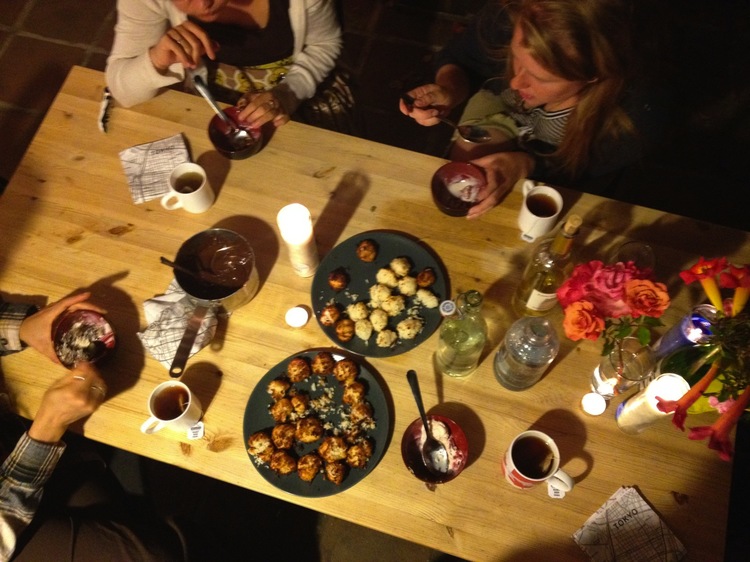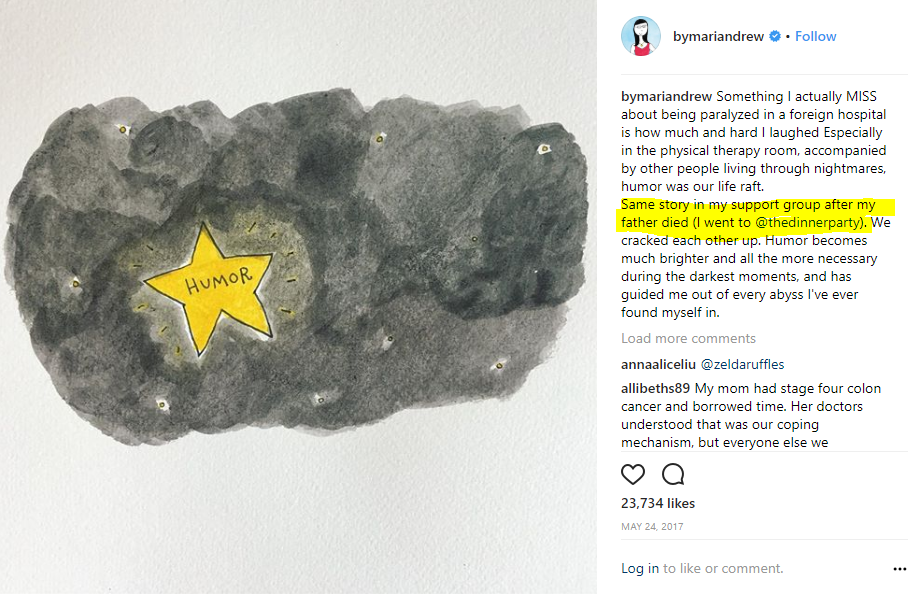
The Dinner Party, a Community Partners project since 2012, has been featured on NPR, profiled by CNN, included on a Buzzfeed list, and raised up by celebrity-backed mega-platforms Goop (Gwyneth Paltrow) and – cue the angelic chorus – O Magazine (Oprah).
Many Community Partners projects do, of course, attract media coverage of their own. But because The Dinner Party – which brings 20- and 30-somethings who’ve experienced loss together over shared meals – has been particularly successful, we thought it would be interesting, instructive and hopefully inspiring to fellow project staff to have a sit-down with co-founder Lennon Flowers and hear a little bit more about what she’s learned about cultivating media coverage and raising awareness about the project.
Shoot high and make the very most of hard-won opportunities
For a breakfast panel on Building Community in the Age of Isolation, sponsored by two supportive funders, that she knew would bring in an audience of philanthropists, media representatives, and other influential people, Lennon and her co-founder, Carla Fernandez, reached out to one of the country’s best known Op-Ed writers – David Brooks of the New York Times. But Brooks was targeted not just for his wide readership and position at one of the country’s top papers of record. His recent writings about what he calls a “crisis of isolation” spoke directly to the underlying philosophy of The Dinner Party, that people have a need to connect authentically around issues that matter. For them, that issue is grief.
“It’s really important to take the time to craft a thoughtful invitation that people really want to say yes to,” says Lennon. “It really wasn’t about us, it was about him.” The letter referenced back to many of his recent columns, provided direct quotes, and made connections to the issues that The Dinner Party puts at the center of their mission. He said yes, but they didn’t stop there.
The event was videotaped, which Lennon drew on to craft an article that pulled out key take-aways and connected those to The Dinner Party mission. She and Carla self-published on Medium (“it’s vastly more useful than our own blog”) and then shared directly with each individual who attended the breakfast as a way to follow-up and begin to cultivate new connections. They also got the article to On Being radio host Krista Tippett through a couple of staff people they knew, and Tippett in turn shared the piece with the show’s nearly 700K+ followers via Twitter. “I would have been okay if it just went to 50 people, as long as it was the right 50 people,” said Lennon. “But this was huge and unexpected.”
Recognize your unique expertise and make connections to current issues
The Dinner Party is about building peer community out of grief, using shared meals as a catalyst. But its vision is bigger than that: to realize "a day in which young people who have experienced loss are recognized not as objects of pity, but as better listeners and better leaders, characterized by profound emphathy, resilience, and agency." The two leaders are good at holding onto this broader vision and thinking about how it connects to other, related issues. When Parkland happened, and the response of the victims was so different than what had happened in the past, Lennon knew she had something to contribute to the conversation.
The piece she wrote – an excellent take on grief as the underlying motivator behind many of our most transformative social movements – appeared in Fast Company, just before the marches against gun violence took place all over the country.
“Attracting media coverage is one thing. It’s great. But if you want to cement your role as a thought leader, you have to exercise your own voice. Forget marketing. What's the larger story behind your work? Where do you want to see the field move" she says. Her recommendation for others: check out The Op-Ed Project, which focuses on encouraging voices from under-represented leaders.
Cultivate powerful partnerships, creatively
The Dinner Party team again used Medium to publish an open letter to Sheryl Sandberg, the COO of Facebook, who wrote a book about loss and grief after the death of her husband Dave. The “Dear Sheryl” post recognized Sandberg’s efforts to normalize conversations about grief and loss and improve workplace responses when employees experience loss – while also connecting those concerns to the work of The Dinner Party. That in itself was a savvy way to connect the project’s work to a broader conversation. Smarter still was that Lennon, who’d met Sandberg’s co-author Adam Grant years earlier, sent the piece along to him. That led to a response from Sandberg herself, and an invitation to meet and discuss a further partnership with Sandberg’s nonprofit effort, Option B.
“We've gone on to collaborate with Option B, and they continue to be a referral service for us,” Lennon shared. “They also published a variation on our Being There guide, which became one of their most popular pieces, and a guidebook on how to support grieving friends over the holidays by opening your doors for a meal."
Sometimes, just being “out there” is a strategy
Continually sharing their story authentically has been the most effective way of increasing their impact, and attracting media attention. Sometimes it comes about in unexpected ways.
A story about The Dinner Party that aired on Boston’s public radio station ended up, to the surprise of the entire staff, as a national story two months later carried on NPR “that created an unbelievable surge in demand” for new tables.
And when a well-known cartoonist with a large Instagram following referenced The Dinner Party in a post, after she’d joined a table in her community to deal with the loss of her father, it sent “a ton of new followers our way.” Likewise, popping up as number one on a crowd-sourced Buzzfeed list about dealing with grief also had enormous impact.
Finally, don’t be daunted
Clearly not every project needs to strive for, or even needs, the kind of broad national attention The Dinner Party has successfully attracted. But the group’s approach to sharing their story can offer some helpful lessons.
Carving out the time to consider how your own work fits into broader conversations about issues both regional and national can help you find more creative and strategic ways to raise awareness about your work. It can help you be more targeted in who you reach out to, how you share your story, and to recognize the value of your own knowledge and expertise.
Lauren Kay is Director of Communications at Community Partners


